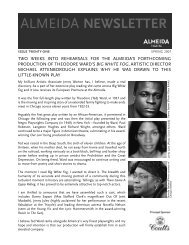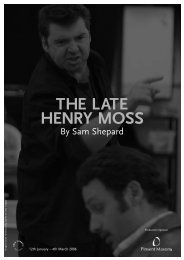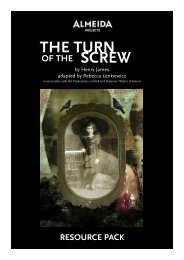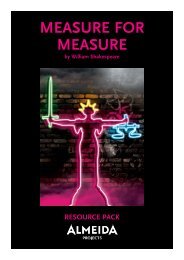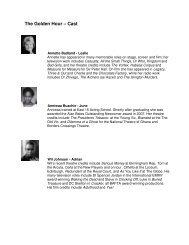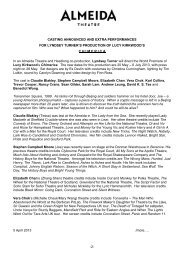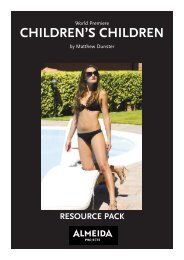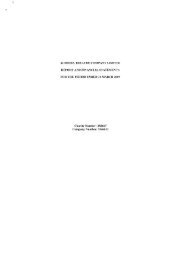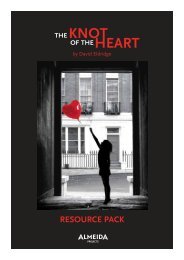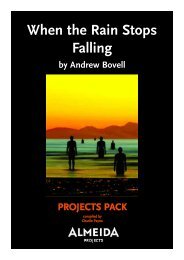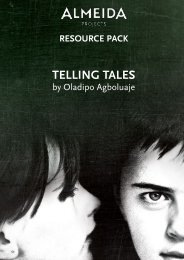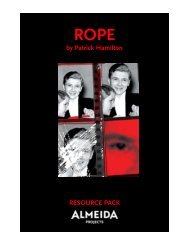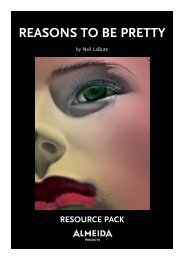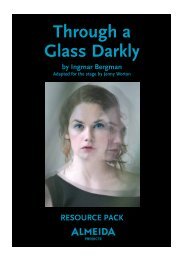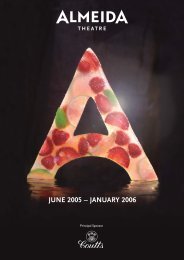MRS KLEIN - Almeida Theatre
MRS KLEIN - Almeida Theatre
MRS KLEIN - Almeida Theatre
You also want an ePaper? Increase the reach of your titles
YUMPU automatically turns print PDFs into web optimized ePapers that Google loves.
6<br />
A letter from Melitta to her<br />
mother Melanie Klein, 1934<br />
‘I hope you will therefore also allow<br />
me to give you some advice. You do<br />
not take it enough into consideration<br />
that I am very different from you. I<br />
already told you years ago that<br />
nothing causes a worse reaction in<br />
me than trying to force feelings into<br />
me – it is the surest way to kill all<br />
feelings. Unfortunately, you have a<br />
strong tendency towards trying to<br />
enforce your way of viewing, of<br />
feeling, your interests, your friends<br />
etc onto me. I am now grown up and<br />
must be independent; I have my own<br />
life, my husband; I must be allowed<br />
to have interests, friends, feelings<br />
and thoughts which are different or<br />
even contrary to yours. I do not think<br />
that the relationship with her mother,<br />
however good, should be the centre<br />
of her life for an adult woman. I hope<br />
you do not expect from my analysis<br />
that I shall again take an attitude<br />
towards you which is similar to the<br />
one I had until a few years ago. This<br />
was one of neurotic dependence. I<br />
certainly can, with your help, retain a<br />
good and friendly relationship with<br />
you, if you allow me enough freedom,<br />
independence, and dissimilarity, and<br />
if you try to be less sensitive about<br />
several things.<br />
Also, don’t forget that through our<br />
shared profession a difficult situation<br />
is created; this could most certainly<br />
be solved if you treated me like<br />
another colleague and allowed me all<br />
the freedom of thinking and<br />
expression of opinion, as you do the<br />
others.<br />
With love<br />
yours, Melitta’<br />
tendencies of the infantile internal world.<br />
Children are highly sensitive to events in the<br />
family environment, but the reaction to<br />
these occurs through the prism of the<br />
child’s phantasy life. Klein took the view<br />
that children have innately an inner world<br />
which is active in creating the view of the<br />
external world. Babies have both<br />
experiences of great satisfaction, and of<br />
great distress. Klein argued that the<br />
mother’s repeated care in restoring the<br />
infant to a good state puts the infant ‘back<br />
together’ and is experienced by the baby as<br />
its relation with a ‘good breast’. Periods of<br />
disturbance or deprivation are experienced<br />
as a relation with a ‘bad breast’. The infant<br />
can sometimes project some of the feelings<br />
which were in origin his own (for instance<br />
that of biting hunger) into the objects of the<br />
Melanie Klein (right), with one of her sons, and Melitta (left). Courtesy of Wellcome Library,<br />
London, and the Melanie Klein Trust<br />
external world. In these ways the infant’s<br />
world is populated with creatures borne of<br />
the imagination, depicted vividly in Maurice<br />
Sendak’s ‘Where the Wild Things Are’.<br />
The Second Period<br />
In the years 1930-45 Klein developed a<br />
whole new theoretical structure,<br />
suggesting that a major change in the<br />
infant’s mind begins at around 4-5<br />
months. The good and the bad objects of<br />
the baby’s imagination which were once<br />
experienced as entirely separate now begin<br />
to be seen as one – the baby comes to<br />
understand that the figure (the ‘bad<br />
breast’) which is feared is the same as the<br />
good figure (the ‘good breast’) which is<br />
loved. This introduces a whole new set of<br />
feelings including the capacity for concern<br />
and anxiety, lest the mother has been<br />
harmed by the baby’s feelings of rage.<br />
Klein argued that this process involves<br />
mourning – that while at first it may be<br />
ushered in by weaning, versions of it recur<br />
throughout life whenever there is any<br />
significant change or loss. It is intimately<br />
connected with mental growth, with<br />
maturation and with creativity.<br />
The Last Period<br />
In the early 1950s Klein made her last<br />
major contribution: her ideas concerning<br />
the damaging effects of envy in psychic<br />
life. Klein felt that many aspects of<br />
aggressive behaviour, of devaluation and<br />
contempt, were unconscious expressions<br />
of envy. Although destructive envy is much<br />
increased by emotional deprivation and by<br />
bad experiences in life, Klein also felt that<br />
fundamentally it derived from the infant’s<br />
envy of the goodness of the breast. She<br />
thought this was universal and to some<br />
extent constitutional. However, this does<br />
not mean that envy, once understood,<br />
cannot be mitigated.<br />
The Influence of Klein’s ideas<br />
Klein’s work was narrower in its range than<br />
Freud’s. This may be one of the reasons why<br />
Klein’s ideas are much less well known in the<br />
public sphere than those of Freud. However,<br />
for many psychoanalysts her major papers<br />
are profound. They are absolute<br />
psychoanalysis rather in the way that<br />
Beethoven’s late quartets are absolute music.<br />
In the half-century since her death Klein’s<br />
ideas have been extended even beyond the<br />
important new developments they led to in<br />
psychoanalysis, towards an understanding of<br />
group dynamics and society itself.<br />
David Taylor<br />
David Taylor is a training and supervising<br />
psychoanalyst of the British Psychoanalytic<br />
Society; he is also the clinical director of the<br />
Tavistock Adult Depression Study.



